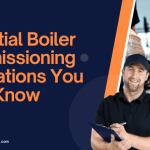Table of Contents
- Introduction
- 1. Compliance with the Local Building Codes
- 2. Regular Inspection and Maintenance
- 3. Proper Installation Practices
- 4. Adequate Ventilation
- 5. Fire Safety Training for Personnel
- Conclusion
- FAQs
Introduction
Boiler installations play a pivotal role in heating and energy systems, particularly in residential and commercial buildings. However, with the functionality of boilers comes the responsibility of ensuring they operate safely. Fire safety regulations are crucial in preventing accidents and safeguarding lives. In this article, we’ll explore the top five fire safety regulations that every boiler installation must comply with to minimize risks and ensure safety.
1. Compliance with the Local Building Codes
Local building codes are the backbone of any construction or installation project. They dictate the standards for safety, health, and the overall welfare of the public. When it comes to boiler installations, complying with these codes is non-negotiable.
Why It Matters:
Building codes are designed to reduce fire risks and ensure that installations meet specific safety standards. Non-compliance can lead to severe penalties, including fines and increased insurance premiums.
What to Do:
- Research Local Codes: Familiarize yourself with the building codes in your area. Organizations like the International Code Council (ICC) provide resources and guidelines.
- Consult a Professional: If you’re unsure, hiring a licensed contractor who understands local regulations can save time and prevent legal issues.
For more information on the importance of building codes in boiler installations, you can check out essential legal requirements for boiler installation.
2. Regular Inspection and Maintenance
Even the best-installed boiler systems can develop issues over time. Regular inspections and maintenance are essential to ensure that boilers operate efficiently and safely.
Why It Matters:
Routine checks can identify potential fire hazards, such as leaks or faulty components, before they escalate into serious problems.
What to Do:
- Schedule Regular Inspections: Aim for at least annual inspections by a certified technician.
- Maintain Records: Keeping a log of inspections and maintenance can provide documentation for compliance and aid in troubleshooting.
Inspection Checklist:
| Item | Frequency | Notes |
|---|---|---|
| Check for leaks | Monthly | Inspect all connections |
| Inspect combustion chamber | Annually | Ensure proper function |
| Test safety valves | Annually | Replace if faulty |
| Clean burner and heat exchanger | Semi-Annually | Improve efficiency |
To ensure that boiler systems are well-maintained, refer to our article on essential boiler maintenance tips.
3. Proper Installation Practices
The installation process is the foundation of a safe boiler operation. Proper installation not only ensures efficiency but also significantly reduces fire risks.
Why It Matters:
Incorrect installation can lead to improper functioning, which may trigger fires or explosions.
What to Do:
- Follow Manufacturer Guidelines: Always adhere to the manufacturer’s installation instructions.
- Hire Qualified Professionals: Ensure that installations are performed by licensed and experienced technicians.
Best Practices:
- Ensure all electrical and plumbing connections are secure.
- Inspect the flue and venting systems to guarantee they are unobstructed and properly fitted.
Also, look for insights on installation day—what to expect for your new boiler to prepare for a smooth installation process.
4. Adequate Ventilation
Ventilation is critical in preventing the buildup of flammable gases and ensuring that combustion occurs efficiently. A well-ventilated space helps mitigate fire risks associated with boiler operations.
Why It Matters:
Poor ventilation can lead to dangerous carbon monoxide buildup and increase the risk of fire.
What to Do:
- Assess Ventilation Needs: Evaluate the area around the boiler to ensure sufficient airflow.
- Install Safety Features: Incorporate smoke detectors and carbon monoxide detectors in proximity to the boiler.
Ventilation Guidelines:
- Maintain a minimum of 1 square foot of ventilation for every 1,000 BTUs of boiler capacity.
- Ensure vents are clear of obstructions and regularly maintained.
For more information on ensuring proper ventilation, see our guide on top ventilation requirements for boiler installations in 2024.
5. Fire Safety Training for Personnel
Training personnel in fire safety protocols is a vital component of any fire safety strategy related to boiler installations. Well-informed staff can act quickly in emergencies and maintain a safe working environment.
Why It Matters:
Knowledgeable personnel are better equipped to prevent accidents, respond to emergencies, and follow safety regulations effectively.
What to Do:
- Implement Training Programs: Regularly conduct fire safety training for all employees involved in boiler operations.
- Simulate Emergency Situations: Conduct drills to ensure staff are prepared for real-life scenarios.
Training Topics to Cover:
- Proper use of fire extinguishers.
- Understanding alarm systems and emergency exits.
- Recognizing the signs of potential boiler malfunctions.
For a comprehensive understanding of safety training, consider reviewing top gas safety regulations for boiler installation in 2024.
Conclusion
Fire safety regulations are essential for ensuring that boiler installations operate safely and efficiently. By complying with local building codes, conducting regular inspections, following proper installation practices, ensuring adequate ventilation, and training personnel, you can significantly reduce the risk of fire hazards. Always remember—safety is a continuous process that requires diligence and commitment.
FAQs
Q1: How often should I inspect my boiler?
A1: It’s recommended to have your boiler inspected at least once a year by a qualified technician.
Q2: What are the signs that my boiler needs maintenance?
A2: Look for unusual noises, leaks, or a sudden increase in energy bills as indications that your boiler may need maintenance.
Q3: Are there specific ventilation requirements for boilers?
A3: Yes, ventilation requirements can vary, but a general rule is to provide at least 1 square foot of ventilation for every 1,000 BTUs of boiler capacity.
Q4: Can I perform boiler maintenance myself?
A4: While you can perform some basic checks, such as visual inspections, it’s best to have a licensed professional conduct in-depth maintenance.
For more in-depth information on fire safety regulations, you can refer to the Occupational Safety and Health Administration (OSHA) and the National Fire Protection Association (NFPA) for authoritative guidelines.





